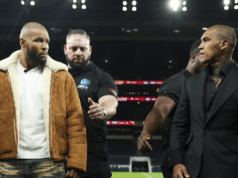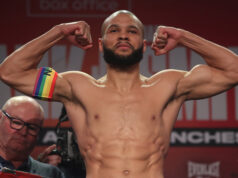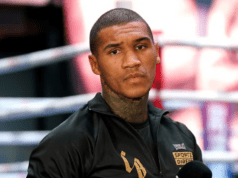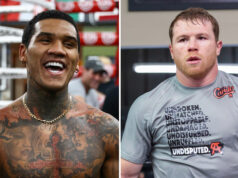The qualities I admire most in a boxer are dedication, discipline and consistency, so it should come as no surprise that I liked former heavyweight champion Chris Byrd. However, I must admit I was slow to come around to Byrd. Although was a middleweight as an amateur, Byrd hit the gym and grew himself into a small, 200-lb heavyweight a year and a half into his pro career. I always take a dim view of that sort of thing, and for many years I wondered if Byrd would not have been better off fighting at a more natural weight. In this fantasy fight, we’re going to find out.
The Backstory
Instead of bulking up with body building, let’s say Byrd sticks to boxing after turning pro in 1993. He has a busier 1993, and most importantly he doesn’t lose his punching power. As a blown-up light heavyweight, Byrd’s punches didn’t have a lot of oomph at heavyweight. At 168 and then 175 lbs, Byrd still lacks one-punch knockout power, but his punches pack a wallop and become deadly when put together in his trademark lightning fast combinations. The result makes him a fan favorite on USA’s Tuesday Night Fights, and by 1997 he has risen sufficiently in the IBF rankings to challenge newly minted World Champion Dariusz Michalczewski. In a tough fight that pits Michalczewski’s strength against Byrd’s speed and guile, Byrd frustrates the big Pole and wears him out, befuddling him into a late round TKO. Byrd returns to the United States and makes his first defense against veteran ex-champ Virgil Hill, where Byrd manages to neutralize Hill’s jab with his head movement and score a big points win.
Byrd reigns as the IBF-WBA-WBO champion and top dog in the division by late 1997, but in the meantime Roy Jones, Jr. has come up in weight to grab the WBC crown, only to lose it in a farce with Montell Griffin. Despite his resounding rematch victory over Griffin, the contrast with Byrd could not be clearer, so for the first time in years Jones is forced to square off with a true world class opponent in his prime…
The Fight
Confident, cocky and thinking of himself in the third-person, Jones comes out looking to give Byrd a taste of his phenomenal talent and put his stamp of authority on the fight from the very outset. Byrd is caught off guard more by Jones’s sheer speed than by the tactic, and makes a mistake by instinctively retreating to the ropes. The result gives Jones a more stationary target, as Byrd’s vaunted head movement proves no match for a man who can snap a left hook as if it were a jab. Byrd ducks a hook, but catches the second one and the right that comes straight down the pike behind it, and slumps down the ropes at 0:33 in the 1st Round.
Jones walks away jauntily and waves in victory, but Byrd is already on one knee and gets up at the count of eight (a man who can absorb heavyweight punches isn’t going to be too badly hurt by Jones). Chastened, Byrd rejoins the fight conservatively, using foot and head movement and his quick, snapping right jab to stymie Jones. Byrd loses Rounds 2 and 3 as well, but by the end of this first stanza two things become clear. First, Jones himself said he found a drained James Toney very hard to hit squarely in their fight. Byrd is even more difficult to nail dead on. Jones makes a lot of contact, and it looks impressive on TV, but in reality he is only brushing Byrd most of the time and doing no damage. Second, where Hill’s left jab would annoy Jones in real life, Byrd’s right jab actually threatens him in this fantasy fight. Jones’s point defense, reliant entirely on his reflexes, proves inadequate to deal with the jab of a man who is almost as fast as he is. Byrd soon forces Jones to bring his hands up.
Jones is also soon forced to fight like a conventional boxer dealing with a southpaw, as Byrd’s head movement and placement of his right glove (the lead glove on a southpaw) neutralize the classic Jones lead left hook. Part of why Jones gets tagged with so many right jabs is that Byrd either slips or parries the hook, and then snaps his jab right up the middle afterwards. Jones must match footwork with Byrd and throw the right hand in a shift missed by all but the truly astute.
By the 5th Round, Byrd feels like he has Jones’s measure and starts throwing his left more, putting together short combinations on the counter. Jones is flustered, not used to being counter-punched, let alone with force, and turns up the pressure. The result is a standing exchange at the close of the round that sees Byrd slip two punches by Jones and land a crunching right uppercut in turn, forcing Jones to back off. The HBO commentary team, who heretofore have been doing everything but throwing the kitchen sink into slandering Byrd, are left stunned and stumbling for an explanation.
Byrd bags the 5th and 6th, but is still trailing on the cards. Jones starts taking risks and thumps Byrd in the 7th. In another savage attack, Jones drives Byrd back up onto the ropes early in the 8th. Jones follows determined to nail Byrd, just like he did the first time. But now Byrd has Jones’s timing down, and the result is a Rope a Dope. Byrd, a master of fighting off the ropes, makes Jones miss, counters him, slips off and fires a sharp five-punch combo against a man who has his left hand down at his waist. Byrd’s straight left lands right on the button, and this time Jones crumples to the floor and in real trouble. Jones rises in time, and Byrd comes after him, producing another knockdown. Jones gets up again and survives the round, but Byrd bags a 10-7 and then goes on to win the 9th.
Much to his credit, Jones recoups and both men fight like tigers for the last three rounds of the fight. The most exciting clash of either man’s career comes to a close, and for the first time ever, no one is really sure who won a Roy Jones fight. A hush settles on the audience as the scorecards are read out: 113-112, 114-111, 112-113, making Roy Jones, Jr. the Undisputed World Light Heavyweight Champion by Split Decision.
The Aftermath
The fight left fans screaming for more, and HBO was eager to pony up the cash and make a marquee PPV event out of the rematch. The problem was that Roy Jones, having bagged the World Title, had no interest in meeting Chris Byrd again. What was worse, his contract with HBO made it impossible for the network to force Jones to fight Byrd, and Jones was happy to avoid Byrd and earn smaller paydays for less risk by fighting on World Championship Boxing.
Byrd’s performance won him an HBO contract, and he was soon the IBF’s #1 contender again. Jones dropped the IBF belt rather than give Byrd a rematch, and later went on to win a heavyweight crown. Byrd followed his rival and did the exact same thing, but unlike his rival he decided to remain in the heavyweight ranks and reigned there for a couple of years. Although Jones would eventually give Bernard Hopkins a rematch, by that time Byrd was retired and too big for a now much slower Jones to handle in any case.










